Researchers have advanced a number of demographic and systemic variables that could account for the low overall turnout and the decline since the 1960s. Most of this research follows Anthony Downs’ (1957) conceptualization of voting as a rational decision-making process: when benefits, either instrumental or expressive, outweigh the costs of voting (e.g., registration, learning about candidates, going to the polls), individuals are more likely to vote. This logic helps to explain the higher voting rates of more highly educated individuals (who have lower marginal costs of political information) and the negative impact of strict registration laws (which increase the time costs of voting). Yet, as the following discussion will show, this cost-benefit analysis obscures as much as it illuminates as a number of recent findings challenge the predicted patterns (Roksa 4).The solution is equally nebulous and, much to the chagrin of political scientists and economists alike, seems to defy concrete measurement. In reality, young people’s unwillingness to vote is a murky combination of institutional barriers, lack of educational resources, psychological and sociological elements. For better or worse, today’s young person needs to feel empowered to exercise their decision-making muscle, at least at first and if youth participation is considered to be a desirable outcome than many people and institutions will have to coalesce to provide that empowerment. In the past, discourse on this topic has been rife with easy, atavistic explanations that only obscure the matter. The data seems to show that pointing our collective finger at the individual citizens that make up each passing generation of youth have not achieved any desirable result. The experts quoted in this paper advocate a new model: “Empowerment efforts seek to enhance wellness, build upon strengths, and identify sociopolitical influences on quality of . An empowerment orientation, however, differs from positive youth development by placing more emphasis on the connection between the individual, micro- and macro-social structures. Empowerment, for example, assumes that many social and health problems can be attributed to unequal access to resources” (Wong 40). Removing barriers to voting legal, institutional and societal, wherever possible is the only conceivable way to increase young voter turnout.
Myths and Easy Answers
Exploring the type of easy-answer theories they have been posited in the past and subsequently revealed to be on shaky empirical ground (or outright disproven) will be instructional as we will be able to observe what misconceptions they led to and how we can avoid them in the future. One theory that seems logical enough on its face is posited in The American Voter Revisited. Lewis-Beck states that younger voters have lesser roots; that the pedantic fineries of politics may be of little interest to young people since the policies enacted don’t effect them directly:
It takes some time for the salience of politics to increase for young adults. Perhaps they are drawn into groups and associations that have a political connection, or become integrated in a community through holding a steady job or buying a home, raising a family and getting involved in local issues. All these steps would make young adults more aware of their own political interests, the impact of political decisions on these interests and the central role of political parties in the processes of governance (Lewis-Beck 149).This theory is testable from a scientific perspective since there are some young people who are married, hold down full-time jobs, have children, mortgages, etc. Based on studies conducted of younger voters, these citizens are quite a bit less likely to vote. "[P]atterns of young adults, being married decreases the likelihood of being registered, while being in school increases it. The presence of children and hours working do not seem relevant. Thus, the hypothesis that young adults increase their political participation as they acquire adult roles is not supported" (Roksa 14).
Another hypothesis, posed by Martin Wattenberg and many others, is that for various reasons - apathy, cynicism, laziness - young people are less politically knowledgeable than they were decades ago. "Today when it comes to political news stories, one could reasonably say, 'Dont ask anyone under 30,' as chances are good that he or she won’t have heard of these stories. Young adults today can hardly challenge the establishment if they don’t have a basic grasp of what is going on in the political world" (Wattenberg 61). This line of reasoning is not only reductive, it suffers from a serious chicken-egg problem. Mr. Wattenberg fails to elucidate whether or not lack of political knowledge led to lower turn-outs or the other way around. What Mr. Wattenberg does state is that for the few that still do vote, their comparative lack of knowledge leads them to be ineffective voters: "[W]e will examine data on whether people of different age groups say they have followed major political events. This is important in and of itself, because if younger people aren’t following what’s going on in politics, they are at a sharp disadvantage in being able to direct how politicians deal with the issues of the day" (Wattenberg 62). I question the veracity of such a statement. Is there an additional box to check on the ballot that says 'please don’t read too much into my vote I don't know what I'm talking about'? The author is making an enormous intellectual leap. He ascribes a mandated message behind one's vote that politicians are somehow supposed to suss out and convert into actionable policy. Irrespective of the individual voters reasoning - which could be well or poorly thought out - it is still one of many hundreds or thousands and cannot be counted as a directive to the politician voter in any but the loosest sense of the word.
In fact, one could take umbrage with Mr. Wattenberg’s very line of inquiry. His data set, which seeks to prove that young people are less well-informed doesn’t stand up to even basic skepticism. Claiming that in the halcyon days of the New Deal and Great Society, young people were well engaged with the hot-button stories and legislation of the day like the Taft-Hartley Act (1948) and the Civil Rights Act of 1964. However, when presented with data that shows contemporary young people were engaged in similarly important questions he cooks up this pithy dismissal: "Although the 9/ 11 Commission hearings and the abuse of Iraqi prisoners at Abu Ghraib were political stories, each had sensationalistic aspects to them that could be spun so as to provide entertainment" (Wattenberg 72).
This is selective data at its worst. The author has basically said that the fact that young people were just as tuned in to the Abu Ghraib prison scandal as older folks doesn't count because it had an entertainment value as well. Apparently the discussions of the Taft-Hartley Act in 1948 and the Civil Rights Act of 1964 were, in the author’s estimation, absolutely sober and rational debates with no sensationalistic aspects at all. Images of strikes, riots, dogs attacking protestors and police turning fire hoses on black Americans must have been totally ignored by young people in what was surely a very serious political debate with no emotions or prurient interest whatever. If one must parse the data in such a baldly arbitrary way, then there is quite likely a problem with conclusion drawn. It's easier to say young people are too busy watching Snooki cross our arms, cluck our tongues and yearn for the days of the past. Arguments about video games, entertainment and lamentations of the passing of the newspaper serve as a neat obfuscation of the type of institutional problems that disengage people from the political process at a young age. "The more than thirty year struggle of college students seeking the right to vote in college towns is a direct contradiction to the frequently accepted description of eighteen- to twenty-four-year-olds as an apathetic demographic. Quite apart from this notion of college students as politically disinterested” (Troy 612).
Another theory, less circular but perhaps equally specious is the idea that young voters are cynical and as such refuse to participate in a corrupt system.
Just what has impaired the development of a sense of duty to vote on the part of this generation of young Canadians is unclear, but it may well have something to do with the fact that they were reaching adulthood at a time when disaffection with politics was growing. This disaffection had a number of sources: the rise of a neo-conservative outlook that advocated a smaller role for the state, a perception that governments were relatively powerless in the face of global economic forces, and a series of constitutional crises and failed accords. All of these factors could have combined to produce a disengaged generation that often tunes out politics altogether. But these circumstances are changing. (Gidengil)Indeed, it’s difficult to reconcile the image of the naïve idealist young person with this other image of the angry, cynical young person who, as a result, refuses to participate in the process. The fact of the matter is, disaffection and cynicism are not at all the exclusive purview of the young (Gidengil) although it has had its moments where it was a common theme of a young generation: “Political disaffection peaked in the mid-1990s and seems to be waning. Meanwhile, security concerns at home and abroad have highlighted the role of the state. One result may be a renewed sense that politics does indeed matter. “
A third theory additionally states that the youth vote suffers from the very same cost-benefit problem that suppresses voting across the board:
"[T]he notorious incentive problem commonly labeled as the paradox of voting. Democracy requires that, at least at some critical junctures, many can participate in political decisions. But if many participate, the impact of a single vote on the outcome is negligible. Hence, the specifically political benefit of voting becomes unable to motivate citizens’ participation, since the cost of voting—albeit tiny—easily exceeds it. Therefore, electoral participation, at least partially, is driven by other factors than the intensity of preferences regarding election outcomes. The most likely motives seem to be a sense of citizen duty, and various pleasures that may stem from the act of voting itself.8 Thus, whatever social mechanisms generate a sense of citizen duty or entertainment value from electoral participation, the groups that appreciate them best are bound to have an advantage over the others in the electoral arena" (Toka 6).A young person, like anyone else, is very likely to take stock of their voting possibilities, realize the infinitesimal likelihood that they can really affect the outcome of an election and decide to stay home. To wit: "One interesting finding is that only about 73% believe their vote counts. When asked to identify the most important reasons for voting for a specific candidate, agreeing with candidates 28% on issues was the most frequently identified as 'most important.' This was more important than leadership, experience, and character” (Carlos, et al. 27-28). Refutation of this theory is difficult but the reason one must place this on the “easy answer” category for the purposes of this paper is that this explanation is in no way unique to young voters. Absent a particularized hypothesis of why the costs would be higher or the benefits lower to young people in particular, there’s no way to support the idea that the rational choice incentive problem particularly effects young people. As such, it is not actionable as an explanation for why young people in particular tend not to vote.
Resultant Misconceptions
As a result of the relatively low turnout of young voters, it is easy to treat it as a bloc of voters that thinks about things roughly the same way. In fact, if one were successful in increasing the “youth vote” one would likely find it growing ever more disparate, wherein other demographic factors may act as better predictors.
"Of course, anyone can invent neat theories about how a particular set of attitudes can systematically influence political involvement and, at least occasionally, vote choice, too. Suppose that the weakness of integration in the political community is an important determinant of vote choices, and, at the same time, a major cause of young people showing below average political knowledge. Then, even if the relatively ignorant young voters were to become more knowledgeable, they may not vote the same way as the currently more involved, young people do. They will still remain different from the latter with respect to an attitudinal determinant of vote choice" (Toka 23).This truism seems logical enough, but it’s worth mentioning because if we are to establish that there is no one cause for the depression of youth voting, it will very likely follow that there isn’t one solution. In fact the reason why it is important to not view the youth vote as a single bloc with a single reasoning methodology behind it will help us to understand the solution to the problem and perhaps why any solution has eluded popular political science in the first place. Often, academic and popular articles (including this one) will refer to the “youth vote” as an easy shorthand which is fine enough as long as there is the accompanying acknowledgement that there is no one “youth vote” in real terms.
The second misconception is that young people are equally unlikely to vote across-the-board. This is totally untrue and this fact is very informative for our discussion later on. "[I]t is a serious misconception to suppose that it is the highly educated young who are failing to turn up at the polls. On the contrary, the more education young people have, the more likely they are to vote. Education remains one of the best predictors of turnout because it provides the cognitive skills needed to cope with the complexities of politics and because it seems to foster norms of civic engagement" (Gidengil, Jamieson). Additionally, it is important to note that this is not a purely American phenomenon. Youth voting is low in every country not just the United States. "Young people in the United States are far from unique in not following public affairs and possessing relatively less knowledge of politics compared to older people. These same patterns can be found throughout the established democratic world in recent years" (Wattenberg 80).
"A misconception is that young [people] are being "turned off" by traditional electoral politics” (Gidengil). Young people are not any more turned off to the political system than anyone else. Which is to say that they are quite turned off to the system indeed.
“They are certainly dissatisfied with politics and politicians. Three in five believe that the government does not care what people like them think and two in five believe that political parties hardly ever keep their election promises. However, they are no more dissatisfied than older Canadians. In fact, they are, if anything, a little less disillusioned with politics than their parents and their grandparents are. In any case, political discontent is not a particularly good predictor when it comes to staying away from the polls. Many people who are disaffected with politics choose to vent that frustration by voting against the incumbent" (Gidengil, et al.)About one-third of the American adult population can be characterized as politically apathetic or passive(Milbrath). The distinction of cynicism belongs to all voters in nearly equal measure. It is a gross misconception to apply disaffection with the system to young people more than any other group.
Since there are barriers to becoming a first time voter, a young person will not always know what to expect when trying to get involved in their political process. For multiple time voters, they know where there polling place is. They know roughly how long they can expect to wait in line, what the people are going to be like, what the smells are like, etc. It may sound silly but the unknown, even for something as benign as voting can be intimidating and young people haven’t developed the voting “habit.” “Instilling voting habits in young adults would likely increase their voting turnout over the lifespan and therefore increase voting rates overall. Furthermore, existing research on young adults usually places all young adults into one category without explaining observed variation between those who do and do not vote and/or does not account for unobserved heterogeneity among young adult" (Roksa 3). In addition to not having actually experienced voting before many young voters have no experienced their first passionate political moment. Since most young people’s politics are some scrambled version of their handed-down parents politics (Lewis-Beck 140), a lot of people have not had the opportunity to develop their own partisanship or ideology. "Voting also tends to strengthen a voter's partisan attachment... The failure of young adults to turn out in large numbers may be largely due to a deficiency of such factors. As these factors develop, so will the propensity to vote, which in turn will boost those factors as well, until participation in elections is all but automatic for individuals of established age" (Lewis-Black 103). Increasing ones attachment to a certain ideology increases greatly ones likelihood to vote and while some create that attachment at an early age, for others, it takes time. Additionally, college students may face hostilities voting near their school from the local residents: "[C]ollege students often face human obstacles as well. Frequently, college students—as a whole—represent a different demographic than their surrounding neighbors. In many cases, community members feel that students are a more politically liberal group and that their interests are contrary to the community’s well-being.
A third and very difficult problem to overcome is the already calcified two-way street of ignorance that already runs between young people and politicians. "Citizens’ equality is, of course, a central component of the notion of democracy. Ordinary citizens may often mistake simple majority rule for democracy—but majority rule itself derives its powerful normative appeal from the fact that it allows each voter to have an equal influence on the outcome" (Toka 2). There is a pre-existing voter inequality problem that exists for young people. Candidates, based on past returns, cannot afford to reach out on a substantively level to the youth vote because the youth vote has been so historically underwhelming. "The present evidence suggests that the socially unequal distribution of turnout and political knowledge does introduce a systematic bias into the electoral arena. If turnout and information-level among citizens were both higher and more equal, systematically different election results may obtain—presumably forcing political parties to adjust their offering to the behavior of a different electorate" (Toka 42). There is, of course, the equally problematic counter-narrative of young people rightfully believing that their interests are not being properly represented by candidates that rarely campaign to them and are almost always at least a generation or two older. Put simply, young people have gotten the democracies they paid for with their lack of political efficacy and turning back the clock on that is going to take multiple elections:
"Suppose that there is a party advocating permissive positions on a range of moral issues, and it appeals to young people in particular. Young people, as we just saw, vote less frequently and know less than their elders. One likely consequence is that the morally permissive party ends up with a lower percentage of the vote than it would have if turnout were 100 percent and all voters equally and fully informed. The wide-ranging political consequences of this percentage difference are the price that the potential electorate of this party—i.e., those who would vote for the party if turnout were 100 percent and all voters perfectly informed—pays for voter inequality. (Toka 10)Undoing what is now decades of nearly nonexistent conversation between candidates and young voters will take time and commitment from both. "Even people who to recognize that they have a voice and that they have the right to use it will remain disempowered if they do not know how to use it or are prevented from using their voice in such a way as to be heard and to make preferences and demands known." (Breton 180).
What Can Be Done?
It’s important to realize from the outset that there is a ceiling to getting out the youth vote in America unless something drastic were implemented like mandatory voting or a change in the voting day. As such reforms seem, to put it mildly, unlikely, we will not consider them a realistic possibility. In the surge of support and civic duty that followed the passage of the 26th amendment, 48% of 18-21 year olds turned out to vote in 1972, along with 51% of 21-24 year olds. It should be understood that the solutions contained on the following pages are mild reforms and are unlikely to eclipse those 1972 numbers if implemented. That having been said, the solution to increasing voter turnout appears to be two-pronged with some small subsidiary solutions to supplement. "A substantial body of literature examines the role of socioeconomic status in voter turnout. This research reveals that individuals of higher SES, regardless whether it is measured in terms of education, income, or occupation, are more likely to vote, with education being the strongest predictor of turnout" (Roksa 5). The name of the game is simple to understand and very difficult to execute: greater education and greater empowerment of voters.Let’s begin with the smaller, subsidiary solutions. As we mentioned earlier, candidates have been burned over-reaching out to youth voters so one cannot blame candidates for being gun-shy to do so again. In fact, the politicians themselves are likely the least culpable party as candidates with broad appeal among youth voters like Howard Dean and Ron Paul are often running at a high-risk with little political reward. It would seem that the solution must be more holistic than a pithy “the candidates need to reach out.” However, were candidates to make a systematic attempt to reach out to young people by discussing their issue in addition to jumping on to pop culture ephemera like social media, then the youth vote would certainly turn out in greater numbers. "One very tangible form of interest is to have a campaign worker or even a candidate turn up at the door: people who reported being contacted by any of the parties during the 2000 campaign were more likely to vote" (Gidengil, et al.). However, this is not unique to or even particularly true of young voters. Any citizen who has direct contact with a candidate is far more likely to turn out to vote than one who hasn’t (Hellman). However, while the risks are well documented, there is a school of political thought that says an effective get-out-the-vote campaign directed at young people conducted by the candidates themselves could be an enormous tactical boon to the right campaign:
Furthermore, changes in the legal structure of voting may affect candidate campaign strategy, election dynamics, and the nature of public policy. For instance, the findings in this report indicate that political candidates, parties, and organizations would be wise to mobilize young citizens in states where voting reforms exist, particularly in states with election day registration. Moreover, those seeking youth electoral support would likely benefit by boosting voter registration rates among young people in states with convenient voting procedures (Fitzgerald 15).“[C]ampaigns could affect the electorate in many other ways. Recent scholarship offers evidence that presidential campaigns mobilize turnout, alter issue preferences and priorities, change perceptions of candidates, and inform voters" (Shaw 346).
A relatively simple but powerful step would be to remove, wherever possible, any administrative boundaries that would prevent young people from exercising their franchise. "An important explanation that has been largely ignored… ever-changing obstacles—including voter intimidation, restrictive residency requirements, and unduly harsh absentee voter regulations—have at least as much, if not more, to do with keeping students from the polls" (Troy 592). College students, especially are being hit with a lot of bureaucratic red-tape. Easing or eliminating burdensome registration procedures as well as centralizing requirements would go a long way towards encouraging new voters. The problem of low voter turnout in the eighteen- to twenty-four year-old demographic is two-fold. “First, students remain largely uneducated about the requirements for voter registration and participation. Even those students that are aware of the basic legal requirements often get confused by the varying ways in which those requirements are enforced across states. Second, college students will continue to face obstacles and harassment at the polls as long as reasonable accommodations are not made to aid their participation" (Troy 612). As illustrated in the chart above less restrictive balloting including, but not limited to, mail balloting could be the single greatest boon to youth voting.
Beyond the more concrete ideas of changes in the way campaigning is done and legislating looser institutional restrictions lies the twin components to an entire universe of new voters: empowerment and education. The two can be discussed separately. Simply encouraging young people that they have the means at their disposal to make good civic decisions is meaningless without giving them the knowledge of the political system. Conversely, educating people on the manner in which our government works is a fool’s errand unless we empower them with desire to want to exercise their right. We will presuppose that part of the reason young people do not vote is that they don’t feel empowered or confident enough to do so (we will explore this idea in greater detail shortly.) Therefore "the first step in the process of empowerment involves one or more activists bringing together in a mutual-aid or self-help group or organization, people who share particular situation of disempowerment" (Breton 181). Indeed, the organization that should be in charge of this “mutual aid” must be the schools as no other institution will have the captive audience, space or manpower to convey the message to young people while they are old enough to understand but still young enough to receive it on a mass scale. Just as schools are supposed to prepare children and young adults for careers and higher education, so too should it be the schools responsibilities to turn out good citizens:
[W]e can assume that more knowledge facilitates a better use of the vote by citizens—the meaning of “better” being defined here by the democratic ideal that elected officials should be responsive and accountable to citizens’ preferences. Similarly, voting for a particular party or candidate will normally carry more information about a voter’s preferences than nonvoting, and thus give more political influence to a given citizen. Hence, the possible conflict between the democratic ideal on the one hand, and social inequalities in the distribution of turnout and political knowledge on the other" (Toka 4-5).The key to encouraging young people to participate in politics is to get them to “’tune in.’ Political engagement presupposes political interest. If young Canadians are not interested in politics, they are not going to spend much time or energy keeping up with public affairs, and still less participating actively in the country's democratic life (Gidengil).
Empowering young people to feel as though they can have a hand in their own future by exercising their franchise represents a sociological and attitudinal shift. Less nebulously, what can be done from a policy perspective; are there concrete actions that can accomplish the goal of getting more young people out to vote? "[T]he single most important step would be to find ways to keep more young people in school. The more education young people have, the more interested they are in politics and the more likely they are to vote, to join groups working for change and to be active in their communities" (Gidengil, et al.). Just as was the case with the other offered solutions, critics say that education has not been enough to encourage young voters:
More access to higher education has provided recent generations with the ability to learn more about politics than their grandparents were able to. But just because the potential is there doesn’t mean that someone will use it. Without reading a daily newspaper, watching the TV news, or otherwise following current events, even the best- educated people will probably not pick up much knowledge about the political world. A lack of basic educational skills might make it difficult for someone to absorb political information, but even the most advanced educational skills will not help if one is not exposed to current affairs through the news (Wittenberg 72)However, I believe this criticism to be a gross over-simplification and argue that greater education of our civic processes must be the fulcrum of any program to increase voter participation amongst young people.
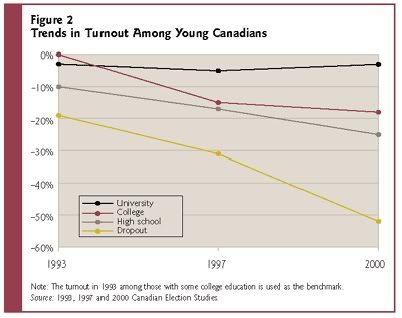 As we have observed, the youth themselves are often blamed for their own disengagement in politics, More people are attending school, the argument goes, so the kids themselves or parents or entertainment must be to blame for the detachment. This assumes that attending school in and of itself would provide cause people to vote – I argue however, that school is not what gives people the confidence to vote, not even education per se but the feeling of being educated; and that feeling is not being properly conveyed to students. Absolutely more youth are attending college today in real terms but sociologically it would seem that the societal emblem of "educated" is being commensurately withheld, measured not against some inert idea of what makes one "educated" or "informed" but against the totality of the rest of the population (Martin 98). As undergraduate enrollment becomes more and more the norm, increasing as it has by 67 percent between 1985 and 2007 (NCES.gov), students with an undergraduate education are being denied the confidence in their own judgment by a society and political process that states as its mantra education is the silver bullet on the one hand but shouts down the notion that even one an undergraduate education or degree one could be considered informed enough to participate in the political system.
As we have observed, the youth themselves are often blamed for their own disengagement in politics, More people are attending school, the argument goes, so the kids themselves or parents or entertainment must be to blame for the detachment. This assumes that attending school in and of itself would provide cause people to vote – I argue however, that school is not what gives people the confidence to vote, not even education per se but the feeling of being educated; and that feeling is not being properly conveyed to students. Absolutely more youth are attending college today in real terms but sociologically it would seem that the societal emblem of "educated" is being commensurately withheld, measured not against some inert idea of what makes one "educated" or "informed" but against the totality of the rest of the population (Martin 98). As undergraduate enrollment becomes more and more the norm, increasing as it has by 67 percent between 1985 and 2007 (NCES.gov), students with an undergraduate education are being denied the confidence in their own judgment by a society and political process that states as its mantra education is the silver bullet on the one hand but shouts down the notion that even one an undergraduate education or degree one could be considered informed enough to participate in the political system. Since it seems to be axiomatically accepted and supported by the facts that the more educated a person is, young or not, then the more likely they are to vote. However, if we stratify the data a little more we see that to not exactly be true. This type of data breakdown has not been specifically studied much in American politics (though it is tangentially referenced often.) There is, however, a Canadian study available that should be similar enough to be usable as a reflection on the American political system. Whereas, in Canada, graduate student voting rates have remained nearly level, if not increased slightly, undergrads and high school graduates have dropped precipitously and surprisingly, at about the same rate. "Another study conducted by the same authors breaks up groups by lesser, middle, and better educated, and predicts likelihood of voting. Turnout for lesser educated youth at age 20 is predicted to be 29 per cent. For the middle educated it is 43 percent, and for the better educated at age 20, it is 58 per cent, which is comparable to total voter turnout for the general population" (Jerema).
It would appear that there is a confidence threshold achieved either by way of education (as represented by the graph) or by way of generalized life experience (where irrespective of education, voting rates increase in the 30s and 40s, when one usually is head of their household and possesses some authority in their professional field) when a citizen no longer feels paralyzed to act as a voter in their political system. In other words, just because people are, from an empirically observed point of view, more educated than they were decades ago doesn’t mean that they necessarily feel more educated (Martin). I must note here that this hypothesis is not necessarily one supported by academic study at this moment. It is, however, based on my admittedly limited experience, the best attitudinal explanation for the ever-diminishing returns on the youth vote. Younger voters, less sure of themselves and their opinions, fearful they might make a mistake or don’t deserve to participate due to lack of knowledge are bowing to the ever mounting societal pressure that they aren’t equipped or prepared to vote even if the law says they are (Wong 80). This type of attitudinal disconnect could be used to explain how our society, absent laws or other binding institutional ways to suppress youth, minority votes, etc. may have found a way to give some voters subtle cues that their input is not welcome: "Across a wide range of democracies, young and old, people whose income or education is low, women, racial minorities and some occupational groups tend to participate less in elections and know less about politics than other citizens" (Toka 6).
So what action does this information say we should take from a policy perspective? It says that empowerment and education must go hand-in-hand from elementary school up through high school civics if we are to agree that participation of young people is a desirable outcome.
The lower social status of youth can be partially justified by their stage of development and legal status. This justification may be warranted from a developmental perspective, as a person’s ability to grasp abstract and complex cognitions is formed in mid- to late adolescence. Legally, young people are not afforded the same rights as adults. Age requirements, for example, determine when a person can lawfully engage in certain activities such as holding a job, voting, driving, and consuming alcohol. As 81 such, young people are not able to fully participate in society in the same manner as adults and have less power to control their own lives as a result. Moreover, this age bias may also create a culture that inhibits adults' interest in or consciousness to provide meaningful roles for youth involvement in the decisions that affect their lives, and in developing solutions for social problems that affect us all (Wong 80).Young people are not necessarily encouraged to be decision-makers or complicit in their own destiny in the early years of life. Therefore, it seems unlikely that the first November after their 18th birthday that they would suddenly flip a switch and feel empowered to take on mantle of participatory government. Even when one’s vote is one of only thousands or millions it can still feel like a big responsibility and under that auspice, it would very well seem that the conclusion most people have come to is to simply not exercise their franchise. "As education is strongly correlated with individuals’ political participation, one could argue that young adults have low turnout rates at least partly because they have relatively low levels of education" (Roksa 16).
Conclusion
It’s tempting to believe that current trends will continue on inexorably, but the fact of the matter is, the demographic trend of lesser involvement on the part of young people is a rather recent phenomenon. According to Wattenberg, as recently as 60 years ago, young people were more plugged in to political knowledge than senior citizens. Especially given the well established lack of knowledge or workable theories to explain it, the phenomenon could just as easily turn around in future elections. “[R]esearchers and practitioners that use [empowerment] aim to increase the capacity of individuals, organizations, and communities by focusing on assets rather than problems, and searching for environmental influences rather than blaming individuals. Establishing critical consciousness is a way to achieve this aim” (Wong 40). The rush to blame the citizens of a generation for paying too much attention to things of no consequence and not enough on items of political import is a sirens call that must be ignored because it obscures underlying societal and institutional problems that may be to blame. Surely, the citizens of my generation spent far too much mental energy remembering Homer Simpson’s home town rather than which two women have been appointed to the Supreme Court in the past 5 years. However, if one could take a time machine back to 1948, it seems a sure bet that a lot more 22 year old would be able to recognize Betty Grable than Hattie Wyatt Caraway. When people stop participating in democracy then that is an institutional failure, not a failure of the citizens. Assuming otherwise leads us down a slippery slope to elitism and nothing could be more anathema to the American Republic.
Works Cited
Bartels, Larry. "Uninformed Votes: Information Effects in Preisdential Elections." American Journal of Political Science, Vol. 40, No. 1. Feb, 1996. pp. 194-230.
Breton, Albert; Breton, Margot. "Democracy and Empowerment." Understanding democracy: economic and political perspectives. ed. Albert Breton. Cambridge University Press, 1997.
Carlos, Ray; DeMaria, Diane; Hamilton, Derrick; Huckabee, Debbie, et al. "Youth Voting Behavior"
Fitzgerald, Mary. "Easier Voting Turnout Methods Boost Youth Turnout."
Gans. "Turnout Tribulations. The Journal of State Government." 65(1), 12-14, 1992.
Gidengil, Elisabeth; Blais, Andre; Nevitee, Neil; Nadeau, Richard. "Youth Participation in Politics." Electoral Insight, July 2003.
Gross, Peter. "Youth voting numbers low throughout history."
Hellman, Emily. “Outside Contact and Young Voter Responsiveness: An Analysis of Voter Mobilization Techniques and Youth.
Jamieson et al. "U.S. Census Bureau, U.S. Dept of Commerce, Voting and Registration in the Election of November 11, 2000."
Jerema, Carson. "But university students do vote: Just because voter turnout is low for 'youth' doesn't mean it is low for all youth."
Keys, Spencer. "The youth vote is about more than just students."
Lewis-Beck, Michael. The American Voter Revisited. University of Michigan Press, 2008.
Martin, Jane Roland. "The Ideal of the Educated Person." Educational Theory. Spring 1981, Vol. 31, NO.2.
Milbrath, Lester. Political Participation. US: Rand McNally & Co. 2nd ed., April 1977.
Roksa, Josipa; Conley, Dalton. "Youth Nonvoting: Age, Class, or Institutional Constraints?" New York University Press.
Shaw, Daron. "The Effect of TV Ads and Candidate Appearances on Statewide Presidential Votes, 1988-96." The American Political Science Review, Vol. 93, No. 2. Jun., 1999. pp. 345-361.
Toka, Gabor. "Voter Inequality, Turnout and Information Effects in a Cross-National Perspective." Budapest, Hungary: Central European University Press.
Troy, Patrick, "No Place to Call Home: A Current Perspective on the Troubling Disenfranchisement of College Voter" Journal of Law & Policy, Vol 22:59, 2007.
Verba, Sidney; Nie, Norman. Participation In America: Political Democracy And Social Equality. University of Chicago Press, 1972.
Wattenberg, Martin. Is voting for young people? : with a postscript on citizen engagement. Pearson Education Inc., 2008.
Wong, Naima. "A Participatory Youth Empowerment Model and Qualitative Analysis of Student voices on Power and Violence Prevention." University of Michigan, 2008.
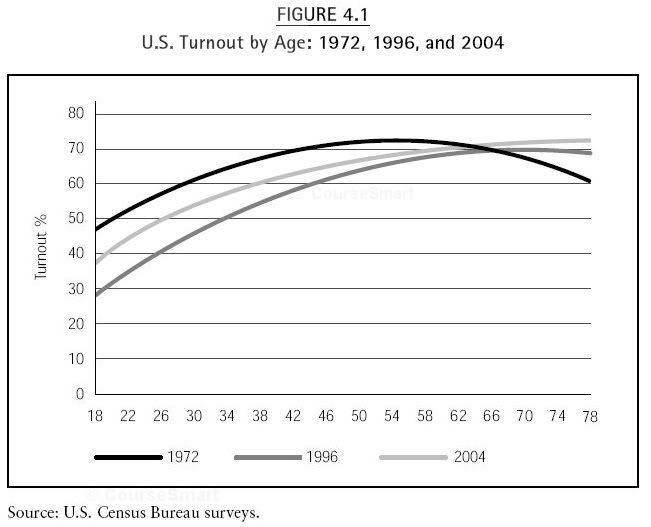
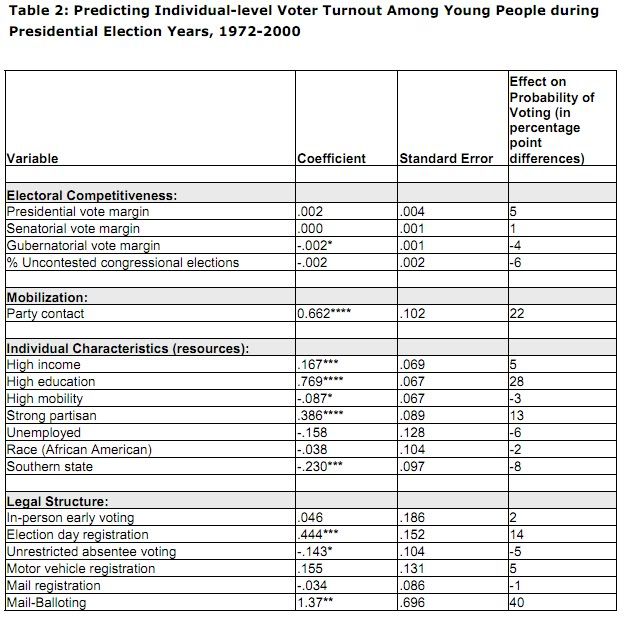
 Rand, Leonard Peikoff and others in her brain-trust offer a tantalizingly simple modality for understanding political systems, sociology and indeed, the epistemological nature of the human mind. Quietly, but with a presence that announces itself more forcefully each year, we are living the heyday of Rand’s intellectual influence. Objectivism has come to the fore in the past 30 years throughout the Conservative Movement in general and the recent rise of Libertarianism in particular. Rand’s scions most famously include Alan Greenspan but also Justice Clarence Thomas, Presidential Candidate Ron Paul and Congressional austerity disciplinarian Paul Ryan.
Rand, Leonard Peikoff and others in her brain-trust offer a tantalizingly simple modality for understanding political systems, sociology and indeed, the epistemological nature of the human mind. Quietly, but with a presence that announces itself more forcefully each year, we are living the heyday of Rand’s intellectual influence. Objectivism has come to the fore in the past 30 years throughout the Conservative Movement in general and the recent rise of Libertarianism in particular. Rand’s scions most famously include Alan Greenspan but also Justice Clarence Thomas, Presidential Candidate Ron Paul and Congressional austerity disciplinarian Paul Ryan. I also believe that any system which renders altruism moot or doesn’t sufficiently explain why the world is far more humane and moral than it has any right to be based on random chance is inherently flawed and thus, has a limited usefulness. However, I credit Objectivists for creating a system so intertwined with man’s selfishness, because what trait is more widely proliferated? To stop there, though, and further, to declare selfishness a moral end unto itself; that I can’t get behind. The ultimate failing of Objectivism and all individualist philosophy is simply that it gives elites, especially economic elites, all the ammunition they need to paper over the devastation caused by inequality.
I also believe that any system which renders altruism moot or doesn’t sufficiently explain why the world is far more humane and moral than it has any right to be based on random chance is inherently flawed and thus, has a limited usefulness. However, I credit Objectivists for creating a system so intertwined with man’s selfishness, because what trait is more widely proliferated? To stop there, though, and further, to declare selfishness a moral end unto itself; that I can’t get behind. The ultimate failing of Objectivism and all individualist philosophy is simply that it gives elites, especially economic elites, all the ammunition they need to paper over the devastation caused by inequality. 

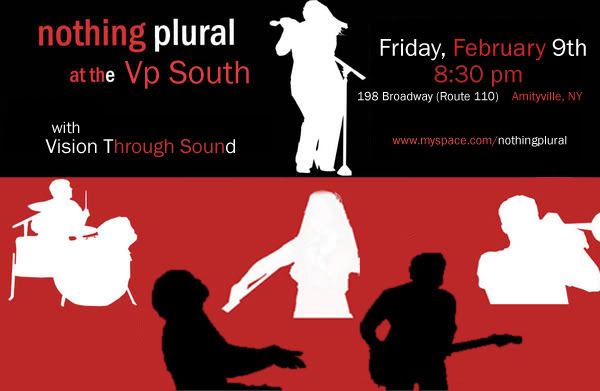
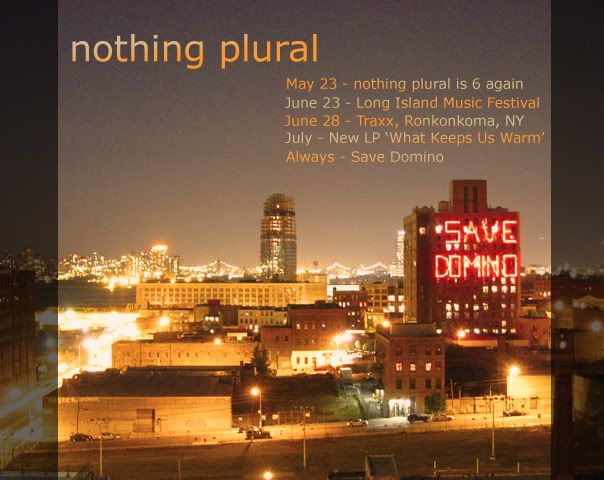
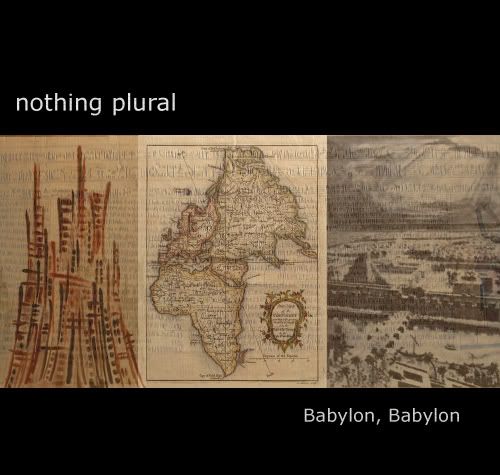


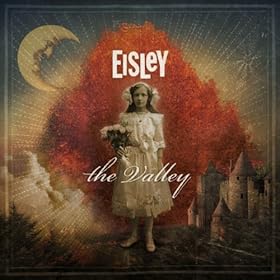 I always wonder why critics reacted to Fleetwood Mac so harshly back in the halcyon days of FM radio in the 70s. Even if as the soft-rock will-they-or-won't they aesthetic might have rubbed some the wrong way as trifle and licentious I wonder how they could have missed - what sounded to my ear today anyway - a sound so sophisticated. Those subdued harmonies, the sad/major chord progressions, the never-overwhelming but still affecting mix of all the instruments: it must have been incredibly difficult to achieve and it always surprises me that the critics back then couldn't hear that. You can string a thin thread from those albums to what Eisley is trying to do today with Valleys. But while the trifle persists from the 70s, the sophistication never really materializes, particularly in the pastel-colored first half.
I always wonder why critics reacted to Fleetwood Mac so harshly back in the halcyon days of FM radio in the 70s. Even if as the soft-rock will-they-or-won't they aesthetic might have rubbed some the wrong way as trifle and licentious I wonder how they could have missed - what sounded to my ear today anyway - a sound so sophisticated. Those subdued harmonies, the sad/major chord progressions, the never-overwhelming but still affecting mix of all the instruments: it must have been incredibly difficult to achieve and it always surprises me that the critics back then couldn't hear that. You can string a thin thread from those albums to what Eisley is trying to do today with Valleys. But while the trifle persists from the 70s, the sophistication never really materializes, particularly in the pastel-colored first half.
 Deep, analogue bass pulse through and around your inner ear. At the same time, a half spoken/half sung monologue conjures cosmic imagery in a low whisper before the guitar crackles like an old photograph lit on fire descending into a pink nose reminiscent of the ending of "Karma Police." Before long, the noise stands aside for a bright acoustic guitar confidently strumming sunny chords before they themselves are standing aside for a blast of thick, forward-leaning distortion.
Deep, analogue bass pulse through and around your inner ear. At the same time, a half spoken/half sung monologue conjures cosmic imagery in a low whisper before the guitar crackles like an old photograph lit on fire descending into a pink nose reminiscent of the ending of "Karma Police." Before long, the noise stands aside for a bright acoustic guitar confidently strumming sunny chords before they themselves are standing aside for a blast of thick, forward-leaning distortion. News is the act of conveying information that has a cultural relevance and/or shared public interest. The information conveyed in this manner, according to Dean Howard Schneider of the Stony Brook News Literacy department must be subject to some manner of journalistic vetting.
News is the act of conveying information that has a cultural relevance and/or shared public interest. The information conveyed in this manner, according to Dean Howard Schneider of the Stony Brook News Literacy department must be subject to some manner of journalistic vetting.